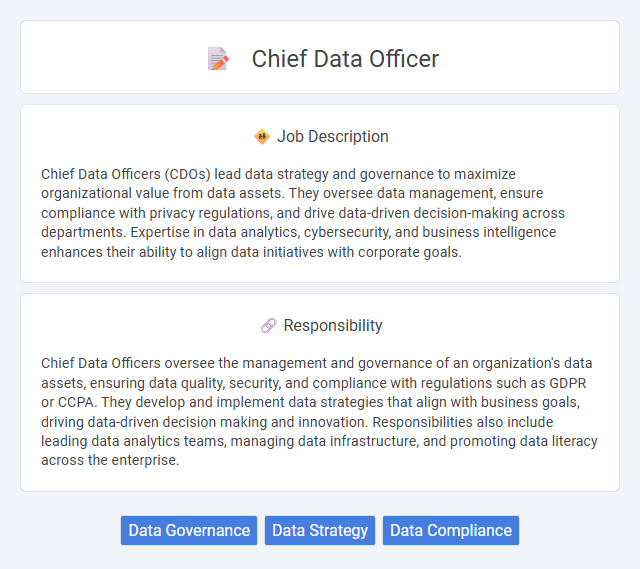
Chief Data Officers (CDOs) lead data strategy and governance to maximize organizational value from data assets. They oversee data management, ensure compliance with privacy regulations, and drive data-driven decision-making across departments. Expertise in data analytics, cybersecurity, and business intelligence enhances their ability to align data initiatives with corporate goals.
Individuals with strong analytical skills, leadership qualities, and a passion for data management are more likely to thrive as Chief Data Officers. Those comfortable with driving organizational data strategy and collaborating across departments may find this role well-suited to their abilities. However, people who prefer routine tasks or lack interest in complex data governance might struggle to succeed in this position.
Qualification
A Chief Data Officer (CDO) typically holds advanced degrees in data science, computer science, or business administration, often combined with certifications in data management, analytics, or information technology. Extensive experience in data governance, data architecture, and regulatory compliance is essential, alongside strong leadership skills for driving data strategy across an organization. Proficiency in emerging technologies such as AI, machine learning, and big data analytics is critical for effective decision-making and innovation in the role.
Responsibility
Chief Data Officers oversee the management and governance of an organization's data assets, ensuring data quality, security, and compliance with regulations such as GDPR or CCPA. They develop and implement data strategies that align with business goals, driving data-driven decision making and innovation. Responsibilities also include leading data analytics teams, managing data infrastructure, and promoting data literacy across the enterprise.
Benefit
A Chief Data Officer likely drives significant organizational value by enhancing data governance and ensuring compliance, which reduces operational risks. They probably improve decision-making through advanced data analytics, leading to better business strategies and increased revenue. Organizations may also experience improved data quality and operational efficiency as a direct result of their data management initiatives.
Challenge
The Chief Data Officer (CDO) likely faces the challenge of integrating vast and diverse data sources while ensuring data quality and compliance with evolving regulations. Balancing strategic goals with data privacy concerns may pose significant difficulties in fostering data-driven decision-making. Navigating organizational resistance to change and aligning data initiatives with business objectives could frequently complicate the role.
Career Advancement
Chief Data Officers (CDOs) play a critical role in driving data strategy, governance, and analytics to enhance organizational decision-making and innovation. Career advancement for CDOs often involves expanding their expertise in emerging technologies like AI and machine learning, acquiring strategic leadership skills, and demonstrating measurable business impact through data-driven initiatives. Networking with industry experts and obtaining certifications such as Certified Data Management Professional (CDMP) can accelerate progression to executive roles like Chief Analytics Officer or Chief Digital Officer.
Key Terms
Data Governance
Chief Data Officers (CDOs) play a pivotal role in establishing and enforcing comprehensive data governance frameworks that ensure data quality, security, and compliance across organizations. They develop policies for data stewardship, monitor data lifecycle management, and collaborate with legal and IT teams to align governance strategies with regulatory requirements such as GDPR and CCPA. Effective data governance under the CDO's leadership enables improved data-driven decision-making, risk mitigation, and operational efficiency.
Data Strategy
Chief Data Officers (CDOs) develop and implement comprehensive data strategies to align data management with organizational goals, ensuring data governance, quality, and security frameworks are in place. They leverage advanced analytics, big data technologies, and data architecture principles to optimize data assets and drive data-driven decision-making. Effective data strategy execution by CDOs enhances competitive advantage, compliance, and innovation across business units.
Data Compliance
A Chief Data Officer (CDO) is responsible for establishing and enforcing data compliance frameworks to ensure organizational adherence to regulations such as GDPR, CCPA, and HIPAA. They implement data governance policies, oversee data privacy risk assessments, and manage compliance reporting to protect sensitive information. Their leadership in data stewardship ensures legal and ethical handling of data throughout its lifecycle.
 kuljobs.com
kuljobs.com